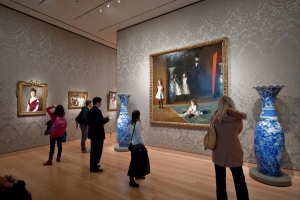|
Displaying items by tag: Museums
Museums in Philadelphia are bracing themselves for the arrival of Pope Francis, who is scheduled to visit the city for the World Meeting of Families (September 22-27), a triennial Catholic event. Cultural institutions around the city are hoping to draw some of the meeting’s estimated 1.5 to 2 million attendees with themed displays.
The Rosenbach Museum and Library will present Catholic texts printed in the New World from the 16th to 18th centuries (September 1-January 30, 2016), while the Free Library of Philadelphia’s rare book department will showcase historical texts from multiple faiths (August 31-January 30, 2016).
Italy’s culture ministry has appointed 20 new directors to manage some of its top museums, including Florence’s Uffizi Gallery, with a number of foreigners brought in to revamp the way the country’s vast heritage is presented to the public.
Fourteen art historians, four archaeologists, one cultural manager and a museum specialist make up the new directors, who will be at the forefront of cultural reform in Italy. The majority have international backgrounds and half are women, although the culture minister, Dario Franceschini, said nationality and gender had no influence on Tuesday’s appointments.
Three Maine museums have received nearly $1 million in federal funding to improve storage at the Monhegan Museum and Maine Historical Society and reinstall the collection at the Portland Museum of Art.
The PMA received $400,000 from the National Endowment for the Humanities; Monhegan and the historical society each received $250,000, with the condition that each raises $50,000 in matching grants.
The first carved woodblock prints by Wharton Esherick, an artist who was a major figure in American crafts, have just been republished. They illustrated "Rhymes of Early Jungle Folk," a book of children's verse, published in 1922.
Pieces by Esherick, known for his expressive, modernist furniture and wood sculpture, are now collected by major museums around the world. But he started as a painter at the Pennsylvania Academy of the Fine Arts in Philadelphia.
Unfortunately, nobody wanted his paintings.
Germany's most important contemporary artist, Gerhard Richter, is the latest art star to criticize the German government's planned tightening of their cultural protection legislation.
Last Sunday, Georg Baselitz took radical action and withdrew all of his works on long-term or permanent loan from German museums to protest government plans, which would restrict artworks classified as “nationally significant cultural heritage" from being exported.
Art Basel announced today that Noah Horowitz has been appointed to the new position of Director Americas for Art Basel, starting in August 2015. Based in the United States, Horowitz will direct Art Basel's Miami Beach show moving forward, further strengthen Art Basel's relationships with galleries, collectors, artists, museums and institutions from the Americas, and promote them throughout Art Basel's activities worldwide. Horowitz joins Art Basel's Executive Committee – led by Marc Spiegler at a global level – alongside Adeline Ooi, Director Asia; Marco Fazzone, Director Resources and Finance; and Patrick Foret, Director Business Initiatives.
In one of his final acts as director of the Museum of Fine Art in Boston, Malcolm Rogers will visit Portland to talk about 21st-century museums.
Rogers, who retires from the MFA at the end of July after 21 years, will talk about how museums must adapt to the times in a discussion at 6 p.m. July 21 at Hannaford Hall on the Portland campus of the University of Southern Maine. His talk is part of the Bernard Osher Lecture Series of the Portland Museum of Art.
Museums have traditionally been spaces of contemplation, refuges from the outside world where visitors can bask in front of masterpieces in quiet serenity.
Well, that's if you don't live in New York City.
In the Big Apple, even art museums can be crushed with crowds and airport security-style lines. These are massive buildings with some of the best collections of art in the world—it's natural. The Metropolitan Museum's attendance stood at a near-record 6.16 million people in 2014; the Museum of Modern Art's was more than 3 million, and if recent visits to the packed new Whitney are any indication, it will blow the old Breuer building's attendance out of the water.
Greece’s debt crisis is not limited to its banks. In fact, its reach extends to the nation’s publicly-funded museums, according to a recent article in The Art Newspaper. After seven years of austerity policies and recent heightened economic uncertainty following the public’s rejection of bailout proposals, Greek art professionals are reporting that museums are running out of money to stay in operation.
“The first things to suffer under the government’s austerity plan have been culture, education, and health,” Denys Zacaropoulos, artistic director of the Macedonian Museum of Contemporary Art, told The Art Newspaper

Once upon a time, our big museums were the “quiet cars” of a fast-track American culture industry. Like libraries, they were places where the volume was low, the energy slow, the technology unobtrusive. You came to them to look, to think and, in the days before museums became the prime social spaces they are now, to be alone in a small, like-minded crowd. You could take a little art home by hitting the postcard rack in the gift shop. But the only way you would retain most of what you saw was by spending time in the galleries and imprinting things on your brain.
That model is pretty much a generational memory now. Today, millions of people stream through major museums, filling the air with a restless rustle and buzz. They move through galleries fast and with a new purpose — cellphones in hand, they’re on Instagram treks and selfie hunts — and with a new viewing rhythm: Stop, point, pose, snap. If you want, you can even take the tour remotely, virtually, as more and more institutions make their collections accessible on the Internet...
|
|
|
|
|